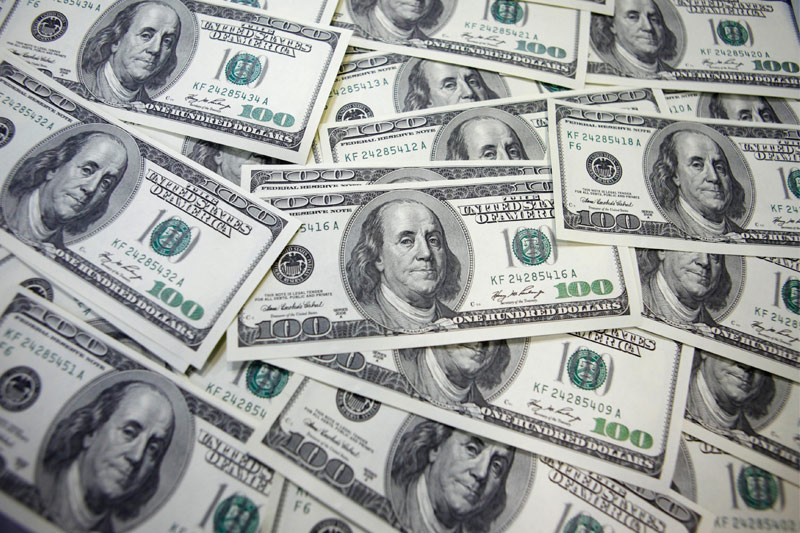Investing.com - The U.S. dollar was modestly higher against its major counterparts on Tuesday, following the release of U.S. data on consumer confidence and housing as simmering concerns over the debt crisis in the euro zone continued to weigh on risk appetite.
During U.S. morning trade, the dollar was higher against the euro, with EUR/USD shedding 0.16% to hit 1.3336.
Earlier Tuesday, a report showed that U.S. consumer confidence dipped slightly in March as a result of higher energy costs, but remained close to the previous month’s one-year high.
The Conference Board’s index of consumer confidence eased down to 70.2 from a reading of 71.6 in February, but was better than expectations for a dip to 70.3.
A separate report showed that the Standard & Poor/Case-Shiller U.S. house price index fell at an annualized rate of 3.8% in January from a year earlier, in line with expectations.
U.S. home prices in December were revised to a decline of 4.1% from a previously reported 4.0% drop.
The dollar had weakened broadly on Monday, as dovish comments by Federal Reserve Chairman Ben Bernanke fanned speculation over the possibility of a third round of easing from the central bank.
The euro remained under pressure as concerns over Spanish borrowing costs weighed ahead of the country’s budget statement on Friday, amid fears that the government will pull back on imposing harsh austerity measures in the face of a looming recession.
Meanwhile, a report earlier showed that an index of German consumer confidence fell unexpectedly in March.
The greenback was almost unchanged against the pound, with GBP/USD dipping 0.01% to hit 1.5969.
In the U.K., a report by the Confederation of British Industry showed that retail sale volumes improved unexpectedly in March, but said that retailers expect conditions to worsen next month amid rising unemployment and higher energy prices.
The greenback was modestly higher against the yen and the Swiss franc, with USD/JPY adding 0.39% to hit 83.14 and USD/CHF easing up 0.09% to hit 0.9036.
Elsewhere, the greenback was higher against its Canadian, Australian and New Zealand counterparts, with USD/CAD rising 0.18% to hit 0.9926, AUD/USD down 0.43% to hit 1.0487 and NZD/USD sliding 0.19% to hit 0.8215.
The dollar index, which tracks the performance of the greenback versus a basket of six other major currencies, was up 0.15% to hit 79.22.
Also Tuesday, Eurogroup chairman Olli Rehn said that euro zone finance ministers would reach an agreement on the size of the bailout fund for indebted countries at a meeting to be held in Copenhagen on Friday.
“We have already taken significant decisive steps towards a stronger and permanent firewall to contain contagion and calm down market stability if it arises. Further reinforcement will be decided on Friday, which will help us remove any remaining doubts”, he said.
During U.S. morning trade, the dollar was higher against the euro, with EUR/USD shedding 0.16% to hit 1.3336.
Earlier Tuesday, a report showed that U.S. consumer confidence dipped slightly in March as a result of higher energy costs, but remained close to the previous month’s one-year high.
The Conference Board’s index of consumer confidence eased down to 70.2 from a reading of 71.6 in February, but was better than expectations for a dip to 70.3.
A separate report showed that the Standard & Poor/Case-Shiller U.S. house price index fell at an annualized rate of 3.8% in January from a year earlier, in line with expectations.
U.S. home prices in December were revised to a decline of 4.1% from a previously reported 4.0% drop.
The dollar had weakened broadly on Monday, as dovish comments by Federal Reserve Chairman Ben Bernanke fanned speculation over the possibility of a third round of easing from the central bank.
The euro remained under pressure as concerns over Spanish borrowing costs weighed ahead of the country’s budget statement on Friday, amid fears that the government will pull back on imposing harsh austerity measures in the face of a looming recession.
Meanwhile, a report earlier showed that an index of German consumer confidence fell unexpectedly in March.
The greenback was almost unchanged against the pound, with GBP/USD dipping 0.01% to hit 1.5969.
In the U.K., a report by the Confederation of British Industry showed that retail sale volumes improved unexpectedly in March, but said that retailers expect conditions to worsen next month amid rising unemployment and higher energy prices.
The greenback was modestly higher against the yen and the Swiss franc, with USD/JPY adding 0.39% to hit 83.14 and USD/CHF easing up 0.09% to hit 0.9036.
Elsewhere, the greenback was higher against its Canadian, Australian and New Zealand counterparts, with USD/CAD rising 0.18% to hit 0.9926, AUD/USD down 0.43% to hit 1.0487 and NZD/USD sliding 0.19% to hit 0.8215.
The dollar index, which tracks the performance of the greenback versus a basket of six other major currencies, was up 0.15% to hit 79.22.
Also Tuesday, Eurogroup chairman Olli Rehn said that euro zone finance ministers would reach an agreement on the size of the bailout fund for indebted countries at a meeting to be held in Copenhagen on Friday.
“We have already taken significant decisive steps towards a stronger and permanent firewall to contain contagion and calm down market stability if it arises. Further reinforcement will be decided on Friday, which will help us remove any remaining doubts”, he said.
